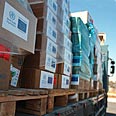
Humanitarian aid en route to Gaza
צילום: דובר צה"ל
Palestinian trade stifled by Israeli control - UNCTAD
Israel's control of main borders, transport routes to West Bank and Gaza Strip mean Palestinian enterprises trying to take part in international trade are totally dependent on political considerations, UN agency says
Israeli restrictions on Palestinian trade have imposed heavy costs on traders and created a "bleak" outlook for Palestinian economic development, a United Nations agency said in a report released on Thursday.
Goods shipped to and from the Palestinian territories should in future use ports in Egypt and Jordan and reduce traders' dependence on Israeli facilities, the UN Conference for Trade and Development (UNCTAD) said.
Israel's control of the main borders and transport routes to the West Bank and Gaza Strip mean Palestinian enterprises trying to take part in international trade are "totally dependent on political considerations," the report said.
"The Palestinian economy's development prospects are bleak under the Israeli internal and external movement restrictions," it added.
'Situation in Gaza getting worse by the day'
Israeli checkpoints, roadblocks and difficult customs and transport procedures have imposed "prohibitive transaction costs" on traders and eroded the competitiveness of Palestinian goods, "posing trade barriers of greater significance than tariffs," the UNCTAD report stated.
Israel has defended the restrictions as a means of defending itself against suicide bombings and terrorist attacks.
Mahmoud Elkhafif, of UNCTAD's unit on assistance to the Palestinian people, told a Geneva news conference the agency was not currently operating in the Gaza Strip, where he said the Israeli clampdown was taking a heavy toll.
"The situation in Gaza is getting worse by the day," he said, stressing the best long-term prospects for Gaza as well as the West Bank lay in trade and new commercial links with the rest of the Arab world as well as the global economy.
The Jewish state has kept its border crossings with Gaza under tight control since pulling out of the territory in 2005, and further sealed off key border crossings after the Islamist group Hamas seized control of the enclave in June.
The UNCTAD report estimated that Israel accounts for 92 percent of the value of Palestinian trade, neighboring Jordan 2 percent and Egypt a fraction of one percent.
It said unemployment in Palestinian territory reached 30 percent in 2006, a year when exports fell 3 percent and imports rose 20 percent, stretching the trade deficit to 73 percent of gross domestic product.
"Alternate routes for Palestinian trade through port facilities in Jordan and Egypt could help break the territory's isolation and reduce dependence on Israeli port facilities," the report said, suggesting Port Said in Egypt and Aqaba in Jordan as good candidates.
"UNCTAD cost-benefit analysis shows that these alternate facilities provide services which are competitive in terms of time and quality, at costs generally equivalent to, or below, those of Israeli facilities," it said.
Attempts to diversify the Palestinian Territories' trade routes "should not be understood as an attempt to achieve quantum leaps in an adverse political environment," UNCTAD said.
The report called for "a shift in the debate from security issues to ensuring the secure flow of trade across the region."










